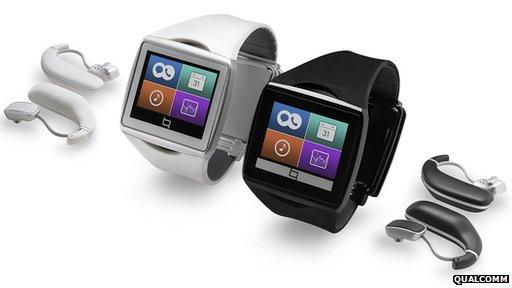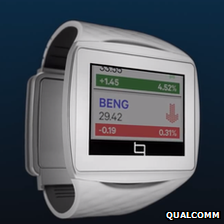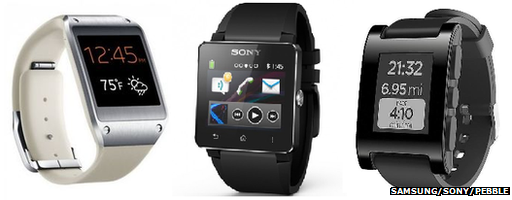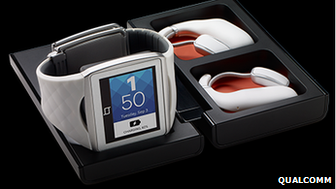Qualcomm Toq aims to give smartwatches a shot in the arm
- Published

Qualcomm is making the Toq available only to US consumers
Qualcomm has released a smartwatch that it says can last days between recharges despite the fact its touchscreen display is always on.
The US company says the "limited edition" Toq is designed to showcase its new technologies rather than compete with its other products.
Qualcomm is best known for making processors that power smartphones.
However, one analyst suggested the device was too bulky to appeal beyond a niche enthusiast audience.
The $349 (£215) gadget is being made available via only Qualcomm's website to US customers, and the company said it was "unlikely" it would sell the watch elsewhere.
Wrist action
The Toq is designed to be paired with any smartphone running Android 4.0.3 or higher.

The watch can be used to check stock prices or the weather forecast
It allows its owner to receive and send text messages, manage reminders and view other information - such as weather forecasts or stock prices - obtained via their handset.
There is no software store for the watch itself, but existing handset apps can be adapted to send details to its display and activate a vibrate function. In addition it can be used to accept or reject calls, and control what music is being played from the linked phone's library.
The company says that the watch's key innovation is its use of its proprietary Mirasol technology.
Rob Chandok, president of Qualcomm Interactive Platforms, described this as being similar to the e-ink displays commonly used by e-book readers and another smartwatch - the Pebble - but better.
Backlight
"In addition to the fact it offers colour, the refresh rate of Mirasol can be 30 frames a second, which allows you to build a touch interface," he told the BBC.
"That's tremendously important when you are trying to offer some of these experiences.
"In an e-ink display you can't refresh the screen fast enough to follow the finger."
Mirasol is significantly less power-hungry than the OLED tech used by Samsung's Galaxy Gear watch, meaning that unlike its rival, its screen does not have to turn itself off when angled away from the user's face to extend battery life.
Sony's Smartwatch 2 does offer an always-on LCD display - however, it requires the user to switch on a backlight in dim conditions.
Although Qualcomm suggests the Toq's lack of an on/off switch makes it the superior option, Mr Chandok acknowledged that the Toq display's graphics were not as vibrant or crisp as the alternatives.
"But we've got other versions of Mirasol in the pipeline that are going to have a better colour gamut and vibrancy," he added.

Samsung's Galaxy Gear, Sony's Smartwatch 2 and the Pebble are other cheaper options
Qualcomm has also included three other technologies it has developed that it hopes will attract the attention of manufacturers:
Stereo Bluetooth headphones, allowing synchronised left and right-channel audio without the need for a wire between the earphones and the watch
WiPower LE - the firm's "drop 'n' charge" tech that allows the headphones and watch to be recharged by placing them on top of the same base
AllJoyn peer-to-peer networking, a system the firm is promoting as a cross-platform way to share data between various gadgets
Mr Chandok said "tens of thousands, but not hundreds of thousands" of the watches were being produced, adding that its appeal was likely to be limited to an "early adopter" crowd.
"We would consider making more if the demand were high," he said. "But our preference is for our partners to bring out products [using the new technologies] in the next six months, and we're working hard with a few people to do that."
He declined to name the companies involved, but did reveal that in theory the Toq could be made compatible with Apple's iPhones.
"We limited the spend on what we were doing and just built the applications on the Android side," he said.
"There's nothing keeping us from doing an iOS app, we just haven't invested in that."
Unproven market
Many analysts believe the market in smartwatches and other wearable technologies - such as Google's Glass eyewear - has the potential for huge growth.

The Toq and its headphones can be wirelessly recharged using the same base
The research firm NextMarket Insights has predicted 373 million smartwatches will be shipped in 2020 compared with fewer than one million this year.
However, one expert warned that Qualcomm and others had to make major improvements to achieve such numbers.
"They are still relatively bulky in watch terms and you still have issues with recharging, which is an alien concept to people with watches," said Chris Green, an analyst at the consultants Davies Murphy Group.
"The Toq offers a little bit more than some of the other smartwatches in terms of what it can do, but it's still ultimately a basic thing offering little more than a second screen, and is quite gimmicky.
"We've still to see anyone offer a smartwatch that delivers something that we actually need."
- Published17 October 2013
- Published4 September 2013
- Published22 August 2013